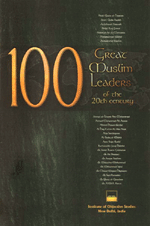THE 100
WHO MADE
A DIFFERENCE
|
100 GREAT MUSLIM LEADERS OF THE 20TH CENTURY
Editor-in-Chief: DR MOHAMMAD MANZOOR ALAM
Editors: PROF. Z M KHAN, PROF. A R
MOMIN, PROF. MANZOOR AHMED,DR SHAUKAT ULLAH KHAN,
PROF. Z A NIZAMI
Pages: 485
Price: Rs 1500 ($50)
Publishers: Institute of Objective
Studies
New Delhi 110 025
|

|
Here is a fascinating account of the Muslim world's response to the major challenges thrown up by the 20th century, challenges like loss of independence at the hands of European colonial powers and the consequent loss of control over their natural resources, loss of their educational and cultural moorings. In short, loss of control over their destiny. The saga is described through the profiles of 100 great Muslims of the century from different countries, cultures and climes.
The twentieth century was, in many significant ways, more eventful than several preceding centuries put together. Marked by a relentless "acceleration of history" (that is Alvin Toffler's celebrated phrase), the century produced a string of spectacular feats of human ingenuity, science and technology.
The century witnessed unprecedented developments in medicine, drastically cutting down on death rate, allowing growth of human population on a scale that was at least five times larger than the growth recorded in the entire four million years of preceding history of humans. Control on mass killers like plague, cholera, small pox, and non-epidemic but lethal diseases like TB allowed millions upon millions of people to live longer and enjoy a fuller life.
However, this century had its darker side, too. It witnessed two World Wars that killed more people than quite a few centuries of wars of the early first millennium. Large-sized wars like Vietnam and other imperial wars cost lives in scores of millions. The rise of totalitarian ideologies in the West like Marxism, Nazism and Fascism (and their regional mutations) led to loss of life and devastation on a similar scale. This century also witnessed the development and use of nuclear weapons with such devastating effect that nuclear powers were frightened out of fighting a nuclear war with each other.
In the entire scenario - both the civilisational-technological progress and the unprecedented manslaughter - the Muslim world was conspicuous by its absence. All this implied tremendous power of knowledge of one kind or the other. The Muslim world did not figure anywhere because since the end of the 16th century it had fallen behind Europe (and major countries settled by Europeans like the United States of America, Canada, Australia, New Zealand, South Africa). The Muslim world could not catch up with the West over the next three centuries: in fact, the gap continued to widen at an increasing rate with each passing year.
At the dawn of the 20th century all 50 or so Muslim countries of the time were firmly under Western colonial rule. Four of them were nominally "free", but they too were under subtle colonial dominance although colonial armies or administrators were not present on their soil. Areas like India or the Malay region, which were not formally part of the Muslim world but had a sizeable Muslim population and a history of civilisational excellence, too, were under the boot of colonial powers. Muslim world was in chains, helpless.
Enchained and helpless, Muslims, however, were not hopeless as Islam equated hopelessness with loss of faith.
The 100 Great portrayed here represented that indomitable Islamic spirit of "never say die". Once they rose to the occasion they knew that the project of deliverance required work on all fronts.
First they had to get independence from western colonial rule, which meant they had to create a cadre of second-line leaders who could lead the struggle for independence. They also needed to educate their people, which required a full-fledged movement for education. Such a movement was required in the first place as they had lost their independence because they had fallen behind in the race for educational development.
Muslim societies worldwide needed extensive reforms because social evils, too, had contributed to their downfall. Social reformers rose to address such problems all over the Muslim world. To give the struggle some ideological consistency and direction important thinkers came forward. For the
Ummah's religious rejuvenation men and women of piety dedicated their lives to the cause. Poets sang the saga of Islam's greatness, raising hopes for the future. Leaders from all these classes have been profiled here
(See Box: Roll of Honour).
The lavishly produced first edition is primarily a collector's edition. Hard-bound, resplendent in green and gold, it comes in a finely crafted box. It's not only the "presentation" or production values that enrich the content, but there are quite a few other features that add value to it. At the beginning there are several pages of coloured maps made by one of the best cartographers of India. These colourful maps show the world in 1900, in 1916, in 1945, in 1989, and in 2000. The world changed dramatically at those points - empires fell, new countries arose, international borders were redrawn. And with all that changed the Muslim world - radically, almost unrecognisably.
The academic value of the book is further enhanced by its incisive foreword and scholarly introduction. Then there is extensive reference and indexing for scholars. The publishers are planning a paperback edition in near future to make it available to a wider circle of readers. All said and done, it is an important beginning, a beginning towards a more thorough understanding of the
Ummah's collective endeavours to protect its faith, identity, culture and material resources.g
Back
